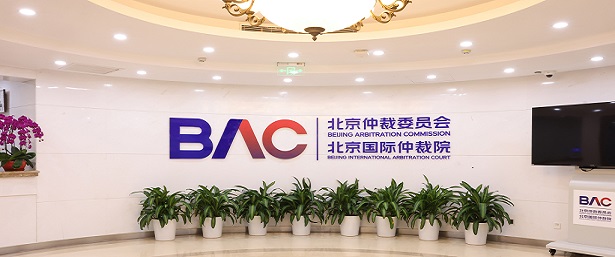
Seminar on “International Investment Economic and Trade Legal Risks and Strategies” Successfully Held
Publish time: Sun Oct 25 23:22:33 CST 2020
On the afternoon of September 4 2020, the seminar on “International Investment Economic and Trade Legal Risks and Strategies” organized by the China Law Society, hosted by the China Legal Exchange Center and the Beijing Arbitration Commission / Beijing International Arbitration Center (the “BAC”) and supported by the Arbitration Foundation of Southern Africa, the Shanghai International Arbitration Center, the Shenzhen Court of International Arbitration, the Nairobi Centre for International Arbitration and the Organization pour l'harmonisationdu Droit des Affairs en Afrique was successfully held. The seminar was themed “Belt and Road Initiative and China-Africa Joint Arbitration”, and was held both in-person and online.
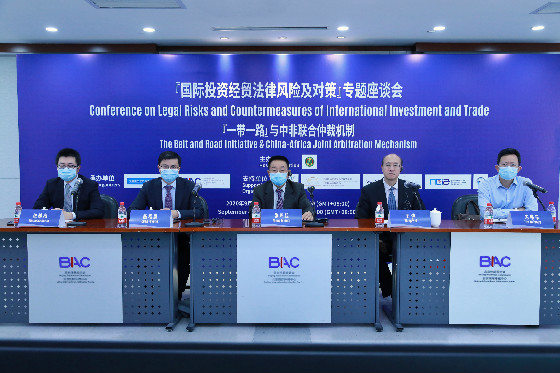
The Seminar (in person)
The Seminar was moderated by Mr. Wang Wei, Vice Director of the China Legal Exchange Center. Mr. Wang pointed out that this Seminar was an important event in the new situation for the purpose of better implementing the outcomes of the Beijing Summit of Forum on Chin-Africa Cooperation, strengthening the legal cooperation between China and Africa and promoting the joint construction of the Belt and Road Initiative.

Mr. Wang Wei
The Seminar started with the opening address of Mr. Zhang Mingqi, Vice President of the China Law Society. Mr. Zhang stressed that in order to overcome the impacts of the pandemic, China and Africa should reach consensus and explore closer institutional cooperation, so as to contribute to the epidemic prevention and economic development. He also suggested to proactively promote the development of the China-Africa Joint Arbitration Center, providing qualified legal services to Chinese and African business entities, to improve the business environment through arbitration, ensuring the sustainable growth of the Belt and Road Initiative, and to make bold innovations in line with the normalized epidemic prevention requirements, trying to find the best practice of cooperation and development. He expected that both Chinese and African professionals actively work together to spread the China-Africa friendship, win the battle against the pandemic, and promote the legal cooperation.

Mr. Zhang Mingqi
In the subsequent panel discussions, Mr. David Butler, Vice President of the Arbitration Foundation of Southern Africa, Mr. Yao Hongmin, Director of Legal Affairs and Director of International Commercial Arbitration Research Center of the Shanghai International Arbitration Center, presented a systematical introduction of the China-Africa Joint Arbitration Center Arbitration Rules. Mr. Butler stressed that the making of the China-Africa Joint Arbitration Center Arbitration Rules is a solid step forward of the China-Africa joint arbitration, which fully respects party autonomy, emphasizes the due process of arbitral procedure, and pays equal attention to requirements of dispute resolution clients from both common law jurisdictions and civil law jurisdictions. Mr. Yao reviewed the process of making the China-Africa Joint Arbitration Center Arbitration Rules, and then clarified the key provisions thereof. He believed that the rules are reasonably arranged with rigorous logic, and the mechanisms such as the relationship between standard rules and local rules and the shared panel of arbitrators well reflected the unity between principle and flexibility, as well as the highlight and combination of advantages of different jurisdictions of China and Africa.
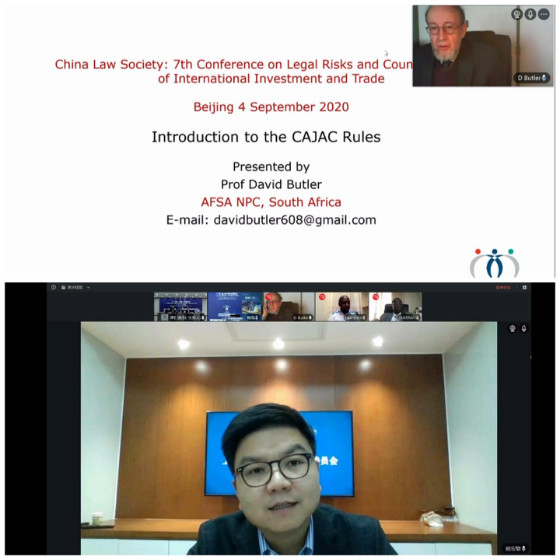
Mr. David Butler and Mr. Yao Hongmin
Thereafter, Mr. Lawrence Ngugi, CEO and registrar of the Nairobi Centre for International Arbitration, Mr. Zhang Haoliang, Director of the BAC’s Business Development (International Arbitration) Division, shared their thoughts concerning the local rules of China-Africa joint arbitration and featured services and case studies of China-Africa economic and trade risk prevention. According to Mr. Ngugi, as a widely welcomed arbitration institution within Africa, the Nairobi Centre for International Arbitration keeps arbitration rules that conform with international practice and meanwhile maintain domestic features. Apart from that, the Nairobi Centre for International Arbitration proactively built external cooperation mechanisms, so as to provide convenient services to international parties. Mr. Zhang pointed out that the BAC International Arbitration Rules fully respect the principle of party autonomy, carry out the idea of flexibility and efficiency, adapt to the dispute resolution cultures of different countries and regions to the utmost extent. Diversified mediations methods and efficient emergency arbitrator mechanisms constitute strong supplement of the BAC domestic rules to the standard rules. Meanwhile, the BAC can also provide international parties with efficient full-process case administration services, various auxiliary services and diversified dispute resolution services, for the purpose of meeting their diversified and individualized dispute resolution needs.
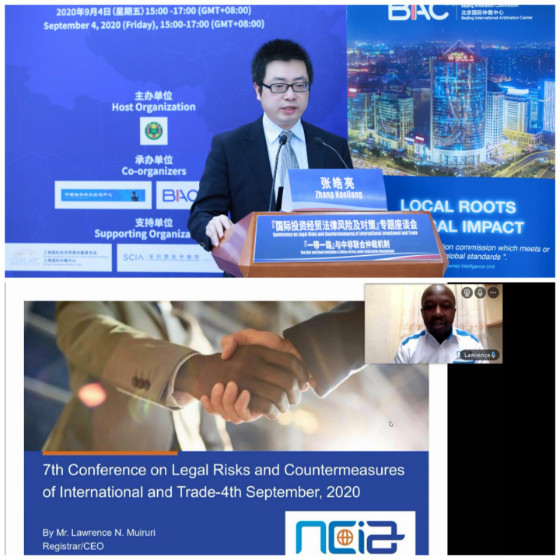
Mr. Zhang Haoliang and Mr. Ngugi
In the session of “Solutions and Case Sharing of China-Africa Joint Arbitration Center in the Context of COVID-19”, Mr. Boubacar Diarra, Director of the Organization pour l'harmonisationdu Droit des Affairs en Afrique, Mr. Huang Guoyong, Director of International Cooperation and Development Division of the Shenzhen Court of International Arbitration, gave speeches. Mr. Diara thought that the impact of the pandemic raises demands for paperless arbitral procedure and virtualized hearings, and the Organization pour l'harmonisationdu Droit des Affairs en Afrique rules has made flexible arrangements concerning ways of hearing and relevant measures. Mr. Huang introduced the explorations of application of new technologies and rules by the Shenzhen Court of International Arbitration in order to deal with the pandemic, as well as its “full-process online hearing”, and provided in-depth analysis of issues of evidence examination, confidentiality, pros and cons. He thought that under the background of COVID-19, the mode of “mediation+arbitration” is more helpful to reach win-win outcomes, and Shenzhen has made valuable explorations in this regard.
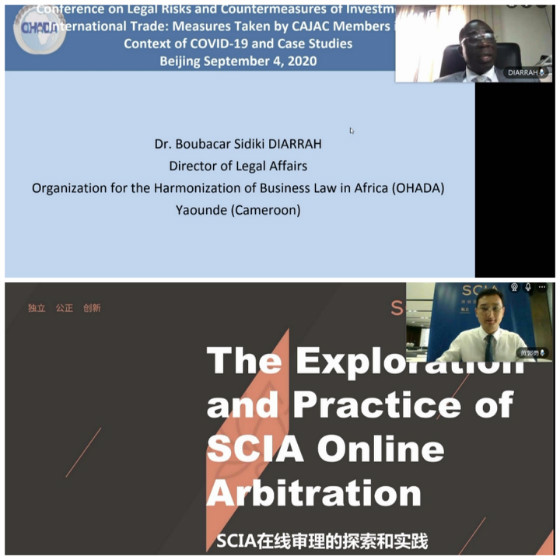
Mr. Boubacar Diarra and Mr. Huang Guoyong
In the last session on “Belt and Road Commercial Dispute Resolution Development”, Mr. Wei Qing, Director of Legal Cooperation Division of Legal Affairs Dept. of China Council for the Promotion of International Trade, pointed out that the China-Africa joint arbitration is an outstanding example of multilateral cooperation mechanism in the Belt and Road context; dispute prevention as the extension and innovation of international commercial dispute resolution, has enormous room of development; and the “full-process” commercial dispute prevention and resolution mechanism can provide more options to the parties. Mr. Zhu Weidong, Research Fellow of China Academy of Social Sciences, believed that based on the comparison of various dispute resolution methods, arbitration is the best way of resolving commercial disputes between Chinese and African parties; China and African countries have strong will to strengthen their cooperation within the arbitration realm, and meanwhile should pay attention to those practical problems and challenges that need to be handled. Prof. Shi Jingxia of the Renmin University of China Law School made a brief analysis of the latest development of arbitration, litigation and mediation in China under the Belt and Road Initiative. She pointed out that Chinese arbitration institutions have constantly improved their capabilities of contributing to the Belt and Road construction by way of revising arbitration rules and improving their services; mixed dispute resolution mechanism including arbitration is a new and beneficial practice.
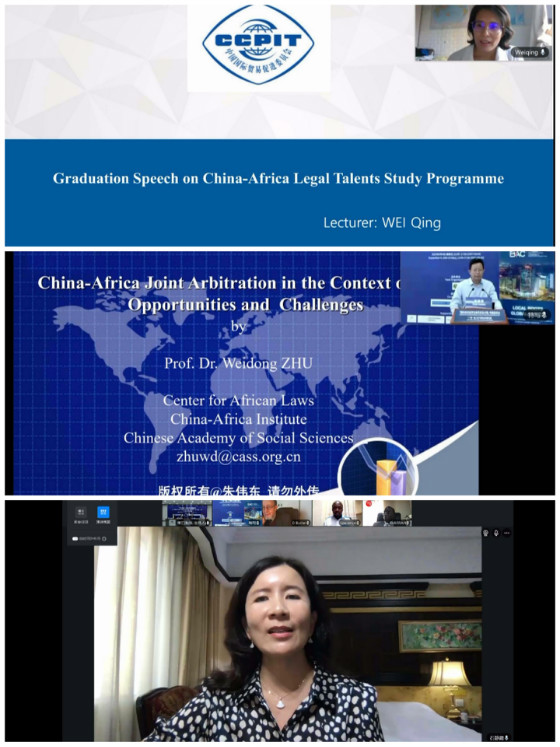
Mr. Wei Qing, Mr. Zhu Weidong and Prof. Shi Jingxia
At the end of the Seminar, Dr. Chen Fuyong, Deputy Secretary General of the BAC delivered closing remarks. Dr. Chen spoke high of the speeches by all the speakers, and briefly clarified the specific design and particular considerations for this event. He particularly pointed out that the China-Africa joint arbitration standard rules are based on “China mode”, which is proposed by African partners; the standard rules are based on Chinese practice in response to the expectations and needs of international arbitration users. The idea of “taking standard rules as foundation and taking domestic rules as supplements” reflects the Chinese and African partners’ idea of seeking common points while reserving difference and giving full respect to domestic features. To view the China-Africa joint arbitration in the context of Belt and Road Initiative will go beyond the relationship between arbitration institutions, and thus could provide insightful inspirations for various cooperation in a greater scope.

Dr. Chen Fuyong
Model Arbitration Clause
Arbitration Clause
All disputes arising from or in connection with this contract shall be submitted to Beijing Arbitration Commission / Beijing International Arbitration Center for arbitration in accordance with its rules of arbitration. The arbitral award is final and binding upon both parties.